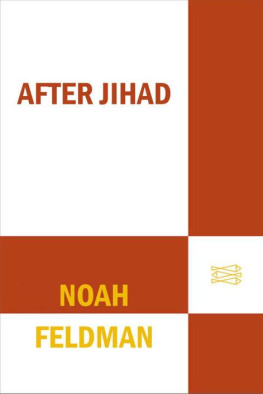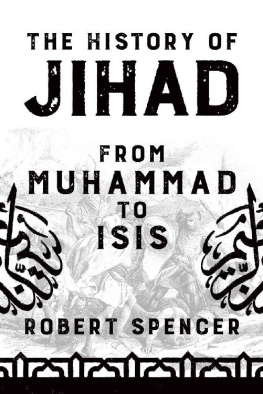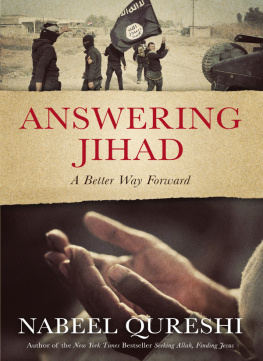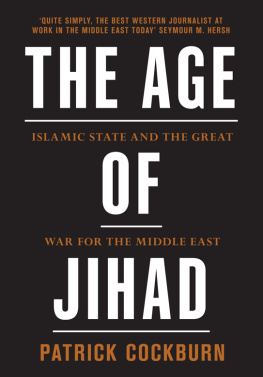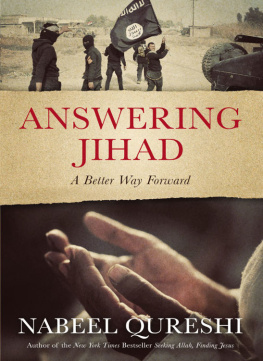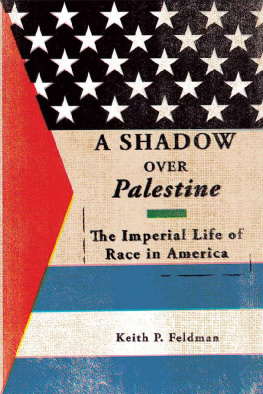
NOAH FELDMAN
After Jihad
NOAH FELDMAN, born in 1970, teaches law at New York University. Feldman received an A.B. summa cum laude in Near Eastern languages and civilizations from Harvard University, a J.D. from Yale, and a doctorate in Islamic thought from Oxford, where he was a Rhodes scholar. A former Supreme Court clerk, he was senior adviser for constitutional law for the Office of Reconstruction and Humanitarian Assistance in the months after the U.S. war in Iraq. His writing has been published in The New York Times, The Wall Street Journal, and elsewhere. He lives in New York and Washington, D.C.
A FTER J IHAD
A FTER J IHAD
A MERICA AND THE S TRUGGLE
FOR I SLAMIC D EMOCRACY

NOAH FELDMAN

F ARRAR , S TRAUS AND G IROUX
19 Union Square West, New York 10003
Copyright 2003 by Noah Feldman
Preface copyright 2004 by Noah Feldman
All rights reserved
Distributed in Canada by Douglas & McIntyre Ltd.
Printed in the United States of America
Published in 2003 by Farrar, Straus and Giroux
First paperback edition, 2004
The Library of Congress has cataloged the hardcover edition as follows:
Feldman, Noah, 1970
After Jihad: America and the struggle for Islamic democracy / Noah Feldman.
p. cm.
Includes bibliographical references and index.
ISBN 0-374-17769-4 (hc : alk. paper)
1. DemocracyReligious aspectsIslam. 2. Islam and world politics. 3. Religion and politicsIslamic countries. 4. United StatesRelationsIslamic countries. 5. Islamic countriesRelationsUnited States. 6. Islamic countriesPolitics and government. I. Title.
BP190.5.D45F45 2003
321.80917671dc21
2002192524
Paperback ISBN 0-374-52933-7
ISBN 978-0-374-52933-8
Designed by Amy Trombat
www.fsgbooks.com
3 5 7 9 10 8 6 4 2
FOR JEANNIE
The Prophet, upon whom be prayer
and peace, was returning from one
of their battles, when he said, prayer
and peace be upon him, You have
made the finest of returns; you have
returned from the lesser jihad to the
greater jihad.
They said, And what is the greater
jihad?
He answered, Mans struggle against
his desires.

We have returned from the lesser
jihad to the greater jihad.
They said, And what is the greater
jihad?
He said, The jihad of the heart.
CONTENTS

PART ONE
The Idea of Islamic Democracy

PART TWO
Varieties of Islamic Democracy
I SLAM AND D EMOCRACY IN S OUTH AND S OUTHEAST A SIA :
M OBILITY AND P OSSIBILITY
P AKISTAN : T HE I SLAMIC S TATE AND THE
S TRUGGLE FOR S TABILITY
T HE D ICTATORS AND THE I SLAMISTS :
T HE P UZZLE OF E GYPT
R EGIME C HANGE AND I TS C ONSEQUENCES :
D ICTATORS WITH O IL
T HE B IG P ICTURE : I SLAM , D EMOCRACY, AND THE
C ONTACT OF M OBILE I DEAS

PART THREE
The Necessity of Islamic Democracy
PREFACE TO THE PAPERBACK EDITION
When After Jihad went to press in the spring of 2003, with the United States poised to remove Saddam Hussein from power by force, the question of whether democracy could succeed in countries with active Islamic politics was an urgent onebut America had not yet committed itself to an answer. Our governments track record of supporting Muslim autocrats in the name of regional stability was still unbroken. The absence of any real Arab democracy figured prominently among the arguments against intervention in Iraq: If the dictator fell, why expect anything better afterward? Free elections in Iraq seemed almost unimaginable, and even if they happened, anti-democratic Islamists might be elected.
In that environment, to call on the United States to take seriously the idea of Islamic democracya form of government both legitimately democratic and respectful of what its citizens consider Islamic valueswas to struggle against historical precedent and received wisdom. After all, Islams rich system of ideas, values, and religious faith revolves around a deep commitment to Gods unity and ultimate sovereignty, and a timeless, divine message expressed in a book of revealed scripture, the Quran. Democracy, on the other hand, as practiced in liberal constitutional regimes today, assumes that laws are made by the elected representatives of majorities, and that basic rights are recorded in founding documents of human origin. Could the apparently competing ideas associated with Islam and democracy combine to create a form of government that would work in practice?
For a decade at least, new voices in the Muslim world had been calling for exactly such a synthesis between democratic and Islamic values, and insisting that the best interpretation of Islam actually required the rule of law, the consent of the governed, and the liberty and equality of all citizens. But these voices could be dismissed by skeptics as either marginal or as hypocritically masking a plan to take over by elections and then establish a dictatorship of the faithful. The few Muslim-majority countries that arguably qualified as democraticsuch as Turkey, Indonesia, Bangladesh, and Malaysiawere either technically secular, only shakily democratic, or both.
A year later, with the removal of Saddam an accomplished fact and the postwar Iraqi political process proceeding along the uncertain road toward a democratic constitution, the fate of Islamic democracy still hangs in the balance. Security problems remain in Iraq, and will continue to jeopardize both the constitutional process and any government that comes out of it. Iraqs delicate balance of Shiis, Sunnis, and non-Arab Kurds may yet fail to coalesce into a unified state capable of withstanding the pressures that inevitably face a new democracy. One crucial fact has changed, however: Americaand through the United Nations, the rest of the worldhas now taken a stand firmly in favor of the possibility of Islamic democracy.
In response, Iraqs Islamic democrats, even those who spent years in political exile in Iran, have rejected the Iranian model of government by mullahs, a model whose failures are as clear to them as to the rest of the democratic world. As if to underscore the extraordinary shift in Islamic political thought that has occurred in the last decade, Sayyid Hossein Khomeinithe grandson of Ayatollah Ruhollah Khomeini, inventor of Islamic clerical ruleemigrated from Iran to Iraq, set up shop in Baghdad, and began trumpeting the virtues of democratic government and religious liberty to anyone who would listen. The grandson lacks the late Ayatollahs charisma, and he is still far from achieving a popular following; but there he is, black robe, turban, and all, an undeniable human fact to those who would deny the existence of Islamic democrats.
The book in your hands is therefore much more practically applicableand its theoretical conclusions more concretely testablethan was its hardcover predecessor. This will be true most obviously for Iraq, where the constitutional deliberations that have already begun directly engage the questions that the first part of the book asks: How can the Islamic idea of Gods sovereignty be reconciled with the democratic ideal of popular government? What are Islamic constitutional values when it comes to basic liberties like free speech and freedom of religion? Does democracys commitment to equal rights for men and women and for people of all religious faiths pose an insurmountable problem for a government that may wish to implement certain provisions of Islamic law? My argument that Islam and democracy can be compatible, since both are flexible, mobile ideas that function in different ways all over the world, is a working hypothesis for evaluating events on the ground in Iraq. If what emerges from the constitutional process there is a form of government recognizably democratic yet still incorporating Islamic ideals as interpreted by Iraqi Muslims, then Islamic democracy will have been shown to be possible in practice, not just in theory.
Next page
